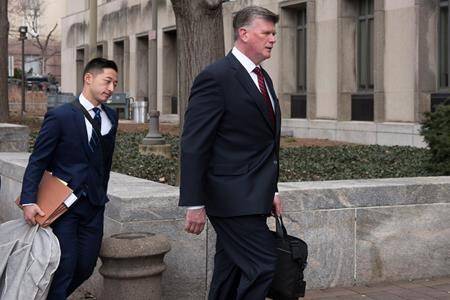Paul Manafort intentionally lied to investigators and a federal grand jury in the special counsel in the Russia probe, a judge ruled Wednesday.
The ruling by U.S. District Judge Amy Berman Jackson was another loss for the former Trump campaign chairman, who faces years in prison in two separate criminal cases stemming from special counsel Robert Mueller’s investigation. It hurts Manafort’s chance of receiving a reduced sentence, though Jackson said she would decide the exact impact during his sentencing next month.
READ MORE: Former Trump aide Paul Manafort found guilty of eight charges
The four-page order resolves a dispute that had provided new insight into how Mueller views Manafort’s actions as part of his broader probe of Russian election interference and any possible co-ordination with associates of President Donald Trump.
Jackson found there was sufficient evidence to say Manafort broke his plea agreement by lying about three of five matters that prosecutors had singled out. That included his misleading the FBI, prosecutors and a federal grand jury about his interactions with Konstantin Kilimnik, his co-defendant who the FBI says has ties to Russian intelligence.
Prosecutors had accused Manafort of lying about his discussions with Kilimnik about a possible Ukrainian peace plan. During a sealed hearing, Mueller prosecutor Andrew Weissmann said one of the discussions— an Aug. 2, 2016, meeting at the Grand Havana Club cigar bar in New York— went to the “larger view of what we think is going on” and what “we think the motive here is.”
“This goes, I think, very much to the heart of what the Special Counsel’s Office is investigating,” Weissmann said, adding: “That meeting and what happened at that meeting is of significance to the special counsel.”
The meeting occurred while Manafort was still in a high-ranking role in the Trump campaign. Rick Gates, Manafort’s longtime deputy and also a Trump campaign aide, also attended.
Prosecutors also accused Manafort of lying about sharing polling data with Kilimnik during the 2016 presidential campaign, an allegation that became public accidentally when Manafort’s attorney flubbed redactions in a court filing.
Manafort’s attorneys had argued that he didn’t intentionally mislead investigators but rather forgot some details until his memory was refreshed. They also said the special counsel hadn’t shown that the topic at issue were material to the investigation.
In her ruling, Jackson said prosecutors did not sufficiently back up two allegations against Manafort, saying she could not find that he intentionally lied about Kilimnik’s role in witness tampering or what Manafort told investigators about his contacts with the Trump administration.
Chad Day, The Associated Press



